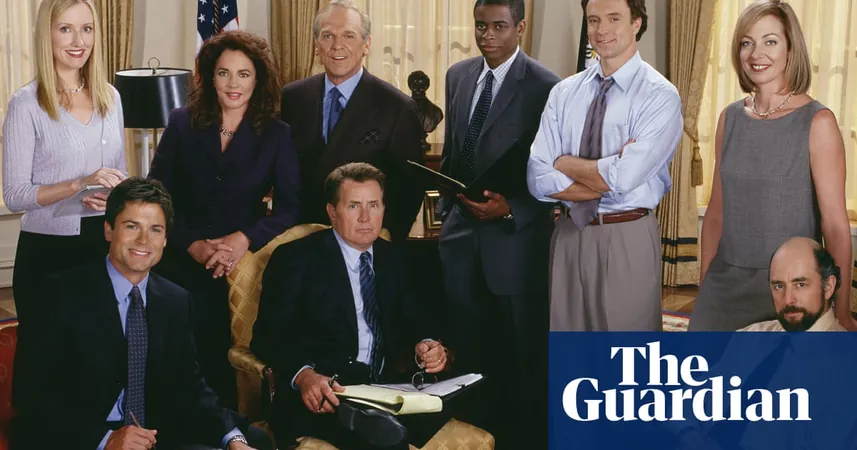
How "The West Wing" Revolutionized Political Drama: A Glorious Yearning for Meaningful Leadership
2024-09-22
In a striking moment from the 2023 apocalypse film "Leave the World Behind," 13-year-old Rose, played by Farrah Mackenzie, finds herself awake in a poignant family scene. Amid her dad's oblivion and her mother's anxiety over her sick brother, Rose's thoughts unexpectedly drift to an episode of "The West Wing."
Her confession—"I keep thinking about this one West Wing episode"—is emblematic of how enduring the show's influence is, even 25 years after its debut on September 22, 1999. Can a series produced in the final days of the 20th century continue to shape contemporary politics and the aspirations of young viewers today?
Created by Aaron Sorkin, "The West Wing" chronicles the White House under President Josiah "Jed" Bartlet, portrayed by Martin Sheen. The show's pilot thrusts the audience directly into the action, showcasing an engaging tableau of political life—the chaotic yet passionate interactions of dedicated staff members as they navigate crises, heartfelt debates, and ethical dilemmas in real-time.
One of the show's standout features is its iconic "walk-and-talk" scenes, which deftly combine dialogue and movement to connect characters and issues. These moments pull audiences into the rapidly ticking political machine, even as early plot lines highlight the era's outdated technology, depicting a world dominated by fax machines and VHS tapes.
Yet "The West Wing" is more than a mere time capsule; it represents a bygone era of political hopefulness that starkly contrasts with current cynicism. While contemporary series like "The Sopranos" and "Breaking Bad" tend to focus on darker themes, Sorkin's series paints a world where goodwill and integrity are paramount, challenging viewers to dream of a leadership based on service and civic duty.
Sorkin himself deemed the series "a valentine to public service," a notion that resonates throughout the narrative. Characters sacrifice personal desires for the sake of their commitment to the president and the American public, emulating a vision of governance as a noble pursuit rather than a battleground of partisanship.
Despite its idealism, critics argue that the show presents an overly simplistic portrayal of American democracy, at times veering into territory characterized by "magical thinking." However, its impact on real-world engagement is undeniable; countless fans credit the show with inspiring their careers in public service.
Ironically, while "The West Wing" embodies a longing for idealism, it simultaneously reveals the inherent complexities and disappointments of political life. The character Toby Ziegler serves as a reminder that progress often requires sacrifice and negotiation, underscoring the gradual unfolding of political realities over slick narratives.
Sorkin himself acknowledged that the series is fiction, crafted during an alternate political milieu that allowed for dreams of a more unified government. "What if" narratives were born from the speculation around the 2000 election, posing an optimistic exploration of what true leadership could look like.
However, as the series progresses, the stark reality yet again rears its head: victory often comes against formidable odds, and compromise becomes the defining feature of legislative success. The show’s characters grapple with frustrating bureaucratic limitations, echoing the collective discontent felt by voters today.
In a modern context fraught with polarization, the need for a return to collaborative governance—as represented in the shining moments of "The West Wing"—is clearer than ever. At a time when electoral engagement is dwindling, the nation's citizens yearn for the spirit of accountable leadership, community responsibility, and the courage to admit mistakes.
This craving can be illustrated with Bartlet's candid acknowledgment of his failings midway through the series, revealing a character willing to confront his shortcomings, a rarity that today's viewers rarely see in political discourse.
In conclusion, watching "The West Wing" evokes a powerful yearning not merely for nostalgia but for a political environment where leaders exemplify integrity, mindfulness, and respect. As contemporary society grapples with complex crises—from socioeconomic disparities to fractured civil discourse—the glimmer of hope from Sorkin’s characters prompts us to advocate for governance that truly serves. Perhaps it’s time we take a page from "The West Wing" and strive for a political reality that not only aspires to, but achieves, the ideals we so critically need.


 Brasil (PT)
Brasil (PT)
 Canada (EN)
Canada (EN)
 Chile (ES)
Chile (ES)
 España (ES)
España (ES)
 France (FR)
France (FR)
 Hong Kong (EN)
Hong Kong (EN)
 Italia (IT)
Italia (IT)
 日本 (JA)
日本 (JA)
 Magyarország (HU)
Magyarország (HU)
 Norge (NO)
Norge (NO)
 Polska (PL)
Polska (PL)
 Schweiz (DE)
Schweiz (DE)
 Singapore (EN)
Singapore (EN)
 Sverige (SV)
Sverige (SV)
 Suomi (FI)
Suomi (FI)
 Türkiye (TR)
Türkiye (TR)